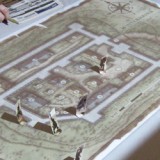The Dark Tower – Fantasy Escape Rooms’ Challenging, High-Fantasy Escape Adventure
While the ongoing COVID-19 situation means that in-person experiences are few and far between, the escape room community has been embracing the remote-only format for the past several months. Instead of having players onsite in a physical room, with the risks and issues that entails, a number of facilities have revamped their offerings to allow teams to play via Zoom or other teleconferencing platforms. Generally speaking, these remote experiences fall into one of two camps.
One, which has become known as the “avatar” approach, makes use of an existing physical room – players guide an actor through the room’s puzzles, allowing them to get most of the experience without putting themselves at risk. The other is somewhere between old-school, point-and-click adventure games like Myst or Zork and tabletop roleplaying games like Dungeons and Dragons. In these experiences, the “rooms” are still images, and players tell the game master what they want more information about or how they want to try and solve the puzzle(s) they’re currently faced with.
We’re All Wizards, Harry
The Dark Tower, one of two remote escape rooms currently available from Fantasy Escape Games, is squarely in the latter camp. Created by the same team behind Escape Long Beach’s solid in-person rooms, The Dark Tower is a 60-minute room hosted over Zoom for up to six players. In terms of the narrative, The Dark Tower has a deceptively simple premise. Players take on the role of wizards who have mastered a specific form of magic (invisibility, shapeshifting, or mind-reading). Their task: help save the land of Seradel from the mad sorcerer Valan by infiltrating his tower and stopping his evil ritual.
Roll for Investigation
Of course, it’s not that easy. In fact, it’s not easy at all. The Dark Tower is challenging even for veteran teams, thanks in part to an adjustable difficulty system; my team played on expert and barely made it through. Even on the family-oriented “beginner” level, it’s likely a good call to bring at least a couple folks who are strong puzzle-solvers. The main differences between difficulty levels are the complexity of the puzzles and their solutions: easier or tougher ciphers, more or less complicated logic, and so on. But part of the challenge also comes from a somewhat unconventional approach to puzzle design. In most escape rooms, any “keys” players find are used once and discarded – one key fits one lock and then you move on
But in The Dark Tower, players aren’t so much finding keys as they are acquiring tools, and those tools are often used multiple times in what initially seem like unrelated situations. It changes the dynamic of the experience in a fun way. Solving a new puzzle often means not only deciphering how the damned thing works, but also going back over the items in your metaphorical backpack to see if anything you picked up earlier can give you an edge. It also leads to some surprising payoffs, when an “aha!” moment about something picked up earlier helps in later challenges.
Write That Down
Taking detailed notes, therefore, is essential for success in The Dark Tower. Since participants never know which item will come in useful later, players need to make sure they keep good track of what they have to hand. It might be nice to give some help there with a built-in inventory management system, but as long as players stay on top of things, they should be fine.
For the most part, the puzzles are interesting and well-designed, requiring a variety of types of reasoning and attention to detail to solve. One or two are a little tough to figure out at first, but for the most part, things feel intuitive and there are plenty of diverse challenges for players.
An Epic Quest
What all this ladders up to is a difficult but rewarding experience told through some solid art and narration. If anything, there might be one puzzle too many, but it might just be a matter of folding it into the climactic finale. But even with that, The Dark Tower is a great room with plenty of story and some innovative tactics that make the experience feel akin to a fantasy roleplaying game.
The idea of giving players unique tools that materially impact the gameplay also showed up in Escape Long Beach’s The Queen, and it’s something I think works well in a story-driven escape room. It would be interesting to see a room that leans even more into the blended escape room/roleplaying game concept, giving players more defined roles akin to Dungeons and Dragons classes and individual tools that alter how certain puzzles are handled.
Happily Ever After
The Dark Tower is an easy recommend, especially for veteran escape room enthusiasts. It’s difficult, yes, but also fun and clever, and making it all the way through feels rewarding precisely because of how challenging it is. Fans of fantasy books, games, or movies will feel right at home, but being genre-savvy isn’t necessary to have a good time.
To learn more about Fantasy Escape Games, or to book your own session in The Dark Tower, you can head to the company’s website here. You can also follow them on Facebook or Instagram.


















